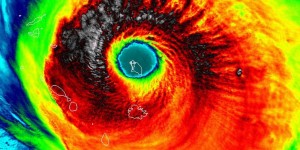From an Article by Susan Glickman, EcoWatch.com, September 15, 2017
As a native Floridian, I chose to ride out Hurricane Irma in my hometown of Tampa—just a few miles north of where the Tampa Bay Buccaneers play football. Like millions of other Floridians who evacuated low-lying beach communities for higher ground, I had the obvious safety concerns and worries about whether I would even have a home to return to. But as a public interest advocate who has worked on climate and energy issues every day for almost two decades, I also have intense concerns about the growing climate change/hurricane nexus.
So when EPA Administrator Scott Pruitt says it’s insensitive to Floridians and Texans to talk about climate change during hurricane emergencies, I say he missed the boat as to what’s truly insensitive.
What’s insensitive is not talking about the links between warmer surface water temperatures and more intense weather events. What’s insensitive is dismantling the Clean Power Plan that was put in place to reduce climate-changing carbon pollution. What’s insensitive is unraveling the environmental protections we all rely on so allies in the oil and gas industry can continue to pollute for free and have consumers pick up the tab.
Plain and simple, we are altering the climate of our planet for all living beings just so that a few people can make money selling, trading and producing fuels and products that emit greenhouse gas emissions. It’s not okay and it’s got to stop.
Increased greenhouse gas emissions are fueling more extreme weather events. It’s just that simple. The warmer ocean temperatures in the Atlantic and the gulf are contributing to more intense hurricanes. Climate change is causing sea level rise that adds to the threat of coastal flooding.
We have needed to act to reduce emissions for a long time, but now we are at a true crossroads. The Arctic is melting, and the permafrost is thawing. As goes the Arctic, so goes Florida. We must take serious action now to both adapt to the climate change impacts that are inevitable from carbon pollution already in the pipeline and to reduce our emissions and future impacts by transforming to a low-carbon economy.
Make no mistake, we’ve known about the problem for a long time. In 1965, three weeks after his inauguration, President Lyndon Johnson said: “This generation has altered the composition of the atmosphere on a global scale through radioactive materials and a steady increase in carbon dioxide from the burning of fossil fuels.” Johnson was responding to the first official governmental report on the possible challenges posed from increasing carbon dioxide (CO2) to dangerous levels.
Even before that, physicist Roger Revelle testified before Congress in 1956 about the relationship between fossil fuel combustion, rising CO2 in the atmosphere, and potentially increased hurricane risk in the Atlantic. So the potential impacts of climate change on hurricanes were known 60 years ago. This is not new news.
So why do so many people today still deny the causes of climate change despite the overwhelming evidence? Since I’m from the Sunshine State, I liken it to the intense rivalry between the University of Florida Gators and the Florida State Seminoles. You pick a team and stick with them through thick and thin. Football allegiances are powerful in Florida. There’s no in between once you take sides.
Similarly, for climate deniers to embrace the largely accepted science they have to renounce their world view and their peers. And while it is difficult to stray from one’s world view, more and more people now see reality staring them in the face.
So without pointing fingers or recrimination, I say that this is the moment we must all confront the realities of a changing climate and acknowledge there are solutions at hand. There is no shortage of data on climate science and, thankfully, there seems to be no shortage of technologies to achieve a low-carbon economy. Transitioning to a clean energy economy will be better for all of us all in the long run, creating jobs, saving money and protecting our natural environment.
Being in a hurricane—or in any crisis situation—does have a certain surreal quality to it. Across the globe we’ve been pummeled with so many recent cataclysmic events—earthquakes in Mexico, fires in the West, mudslides in Sierra Leone—and now the nearby devastation from Hurricane Harvey is fresh on our minds. Every day it’s like we’re watching a movie—an intriguing thriller—except this one is real. Climate change is happening and we’re seeing it play out before our eyes. It would be insensitive to continue to ignore the signs and fail to take action.
Susan Glickman is the Florida director of Southern Alliance for Clean Energy.


{ 1 comment… read it below or add one }
Dear Friends,
All over the world people and leaders understand global warming is advancing rapidly.
Only in the power centers of the hydrocarbon industry in the U. S and among their subordinate politicians is there resistance.
Self-interest that ignores facts and science, you could call it!
Tom Bond, Lewis County, WV